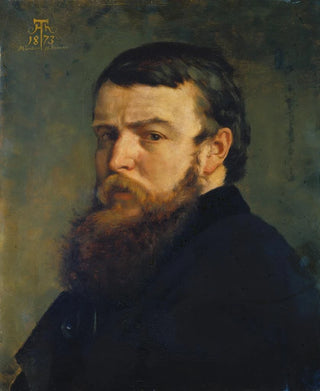Art print | Munich Self-Portrait - Hans Thoma


View from behind

Frame (optional)
Munich Art print by Hans Thoma – Captivating Introduction
The Munich art print, an iconic work by Hans Thoma, serves as an open window into the artist's soul and the tumult of his era. Created at the end of the 19th century, this piece embodies not only a personal exploration but also a dialogue with the surrounding artistic movements. As viewers contemplate this work, they are invited to delve into Thoma's inner universe, where introspection and outward world representation intertwine. The art print stands out for its ability to capture not only the physical appearance of the artist but also his emotions and reflections, making this piece profoundly compelling.
Style and uniqueness of the work
Hans Thoma's style is often described as a blend of realism and idealism, and the Munich art print is no exception. The color palette, both soft and vibrant, creates a warm atmosphere, while the artist's facial features reveal poignant expressiveness. Thoma employs a painting technique that emphasizes nuances of light and shadow, giving his art print an almost sculptural dimension. The meticulous details of his hair and intense gaze demonstrate undeniable technical mastery. This piece does not merely depict a face; it tells a story, an identity quest. The subtly blurred background highlights the figure of the artist, emphasizing his isolation and self-reflection in a rapidly changing world.
The artist and his influence
Hans Thoma, born in 1839 in Germany, was an artist whose work was marked by an unceasing quest for truth and beauty. Influenced by Romanticism, Symbolism, and Realism, he developed a style that was uniquely his own, blending tradition and innovation. Thoma was also a passionate advocate of folk art, seeking to incorporate elements of German folkloric culture into his work. His influence extended beyond his own creations; he also mentored many artists of his generation, sharing his vision of accessible, meaningful art. Through the Munich art print

Matte finish

View from behind

Frame (optional)
Munich Art print by Hans Thoma – Captivating Introduction
The Munich art print, an iconic work by Hans Thoma, serves as an open window into the artist's soul and the tumult of his era. Created at the end of the 19th century, this piece embodies not only a personal exploration but also a dialogue with the surrounding artistic movements. As viewers contemplate this work, they are invited to delve into Thoma's inner universe, where introspection and outward world representation intertwine. The art print stands out for its ability to capture not only the physical appearance of the artist but also his emotions and reflections, making this piece profoundly compelling.
Style and uniqueness of the work
Hans Thoma's style is often described as a blend of realism and idealism, and the Munich art print is no exception. The color palette, both soft and vibrant, creates a warm atmosphere, while the artist's facial features reveal poignant expressiveness. Thoma employs a painting technique that emphasizes nuances of light and shadow, giving his art print an almost sculptural dimension. The meticulous details of his hair and intense gaze demonstrate undeniable technical mastery. This piece does not merely depict a face; it tells a story, an identity quest. The subtly blurred background highlights the figure of the artist, emphasizing his isolation and self-reflection in a rapidly changing world.
The artist and his influence
Hans Thoma, born in 1839 in Germany, was an artist whose work was marked by an unceasing quest for truth and beauty. Influenced by Romanticism, Symbolism, and Realism, he developed a style that was uniquely his own, blending tradition and innovation. Thoma was also a passionate advocate of folk art, seeking to incorporate elements of German folkloric culture into his work. His influence extended beyond his own creations; he also mentored many artists of his generation, sharing his vision of accessible, meaningful art. Through the Munich art print






